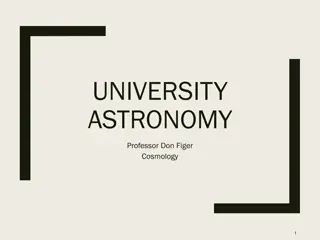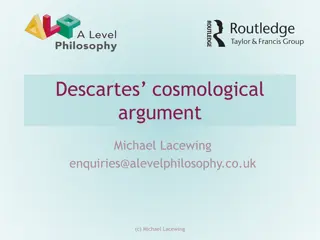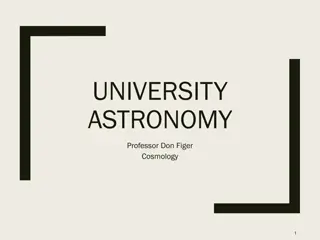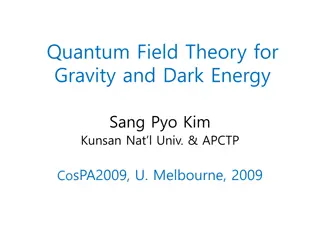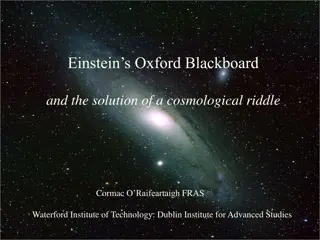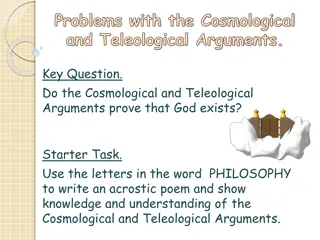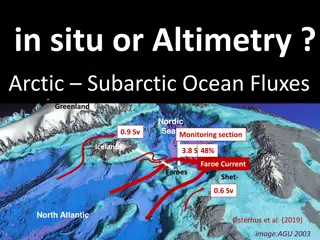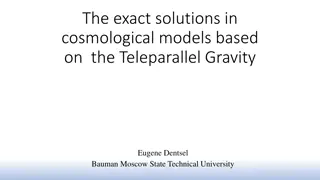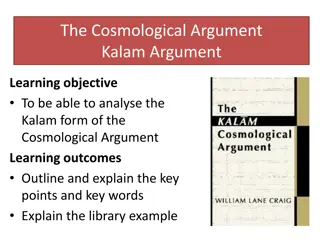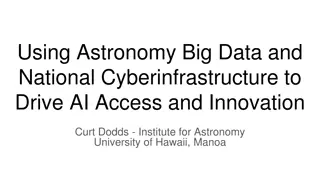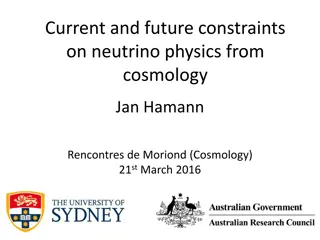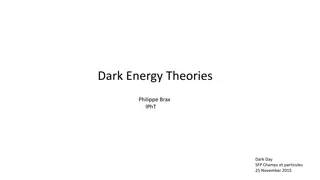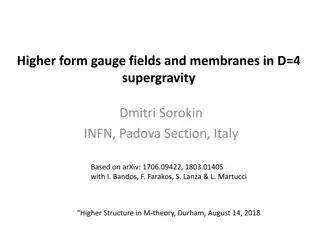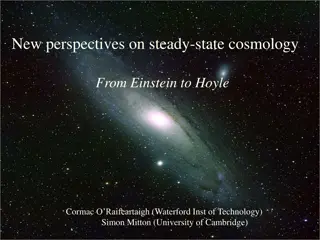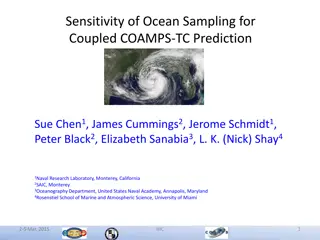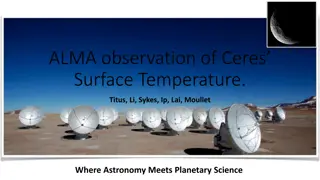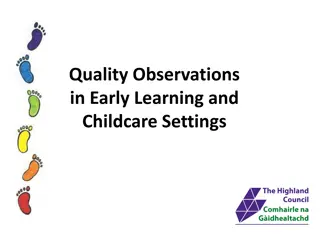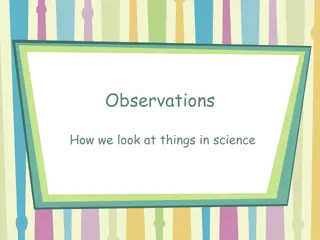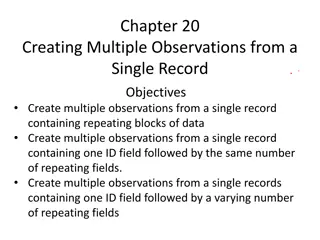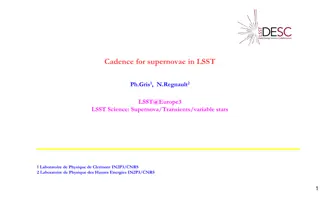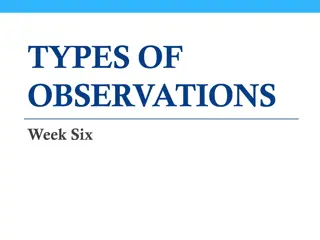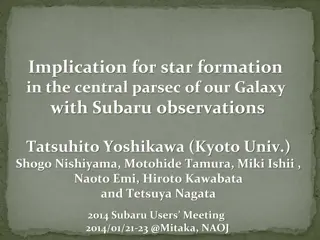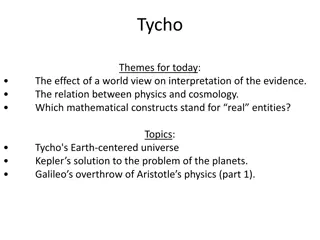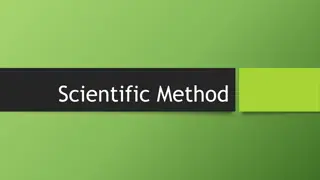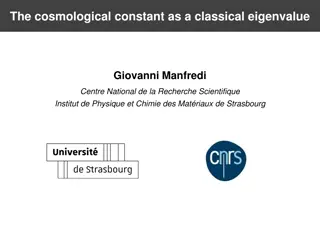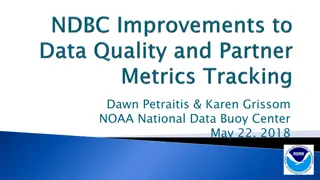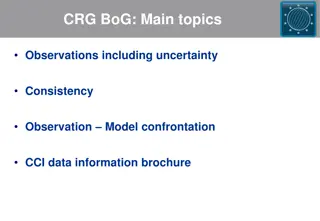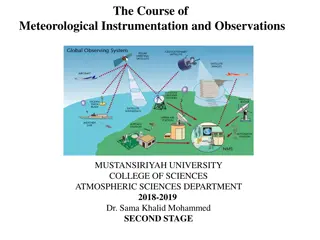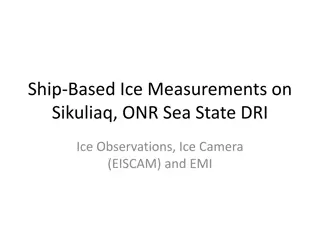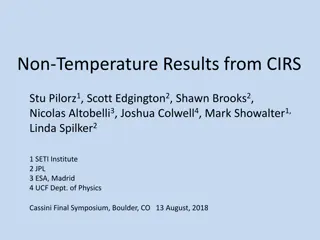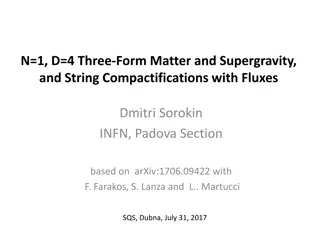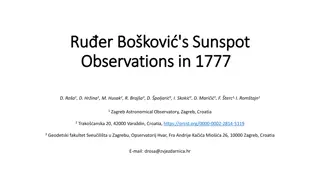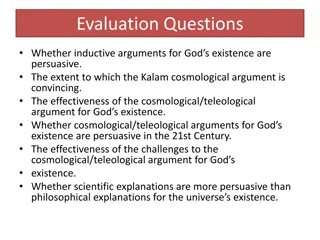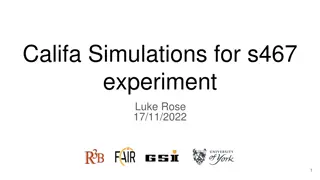Status of Activities Supporting the Space Weather Observations (SWO) Office
The status of activities supporting the Space Weather Observations (SWO) office, including implementation aspects and programs. It also emphasizes the importance of space weather information in various industry sectors and the need for planning follow-on missions for continued observations.
7 views • 26 slides
Understanding ESSER Monitoring Observations in Pennsylvania Education
Explore the top 10 ESSER monitoring observations from the Commonwealth of Pennsylvania Department of Education. Learn about the structure, content, facilitators, and key areas of review involved in assessing educational programs. Gain insight into how observations play a crucial role in ensuring com
1 views • 42 slides
Evaluation of SPLASH and HRRR Soil Moisture Comparison
This study compares soil moisture data between the HRRR model and SPLASH observations during the 2022 warm season. It explores differences in soil moisture levels at various depths, evaluates responses to precipitation events, and drydown periods. The research focuses on analyzed data from HRRR Mode
3 views • 12 slides
UNIVERSITY ASTRONOMY
Delve into the fascinating realm of cosmology as we unravel the mysteries of the Universe, from its origins with the Big Bang theory to the accelerating expansion and potential fate of the cosmos. Discover the history of cosmological thought, from Aristotle to Newton, and ponder profound questions a
0 views • 50 slides
Descartes' Cosmological Argument and Existence Inquiry
Descartes presents a cosmological argument questioning the existence of anything, focusing on what causes his own existence. He explores different aspects such as perfection, dependency, and the idea of God as a necessary cause for existence. Challenges about the nature of continued existence are al
0 views • 17 slides
Exploring Cosmology: A Journey Through the Universe's Mysteries
Delve into the fascinating field of cosmology with Professor Don Figer as he unravels the big bang theory, cosmological observations, and ponders the fate of the Universe. Learn about the origins of cosmology, its elements, history from Aristotle to Newton, and the evolution of our understanding of
0 views • 56 slides
Exploring Quantum Field Theory for Gravity and Dark Energy
Delve into the fascinating realms of quantum field theory as applied to gravity and dark energy, unraveling the mysteries of the universe through concepts like vacuum energy, cosmological constants, and dark energy models. Discover the interconnected web of theories concerning the early universe, in
0 views • 27 slides
Einstein's Oxford Blackboard: Unraveling the Cosmos in 1931
Einstein's lectures in Oxford in 1931, focusing on his blackboard model of the cosmos, shed light on anomalies in his previous work and marked a pivotal moment in 20th-century science. This glimpse into Einstein's views of Oxford and his interactions with the academic community gives insight into hi
4 views • 14 slides
Understanding and Addressing Instability in Particle Accelerators
In this document, E. Shaposhnikova from CERN discusses observations and cures for instability in particle accelerators. The content covers types of instabilities, observations like direct and indirect effects, and possible cures such as modifying the source, passive and active damping, and changing
2 views • 30 slides
Exploring Problems with Cosmological and Teleological Arguments
Dive into the challenges faced by the Cosmological and Teleological Arguments in proving the existence of God. Explore key questions, acrostic poems, lesson outcomes, and activities to deepen your understanding of these philosophical concepts. Discover how scientific theories like the Big Bang Theor
0 views • 6 slides
Monitoring Faroe Current Transport with Satellite Altimetry and In-situ Observations
Combining satellite altimetry and in-situ observations offers a comprehensive approach to monitoring volume, heat, and salt transports in the Faroe Current. The study focuses on the representativeness of ocean observations in the Arctic and Subarctic regions, highlighting the importance of combining
0 views • 11 slides
Observational Constraints on Viable f(R) Gravity Models Analysis
Investigating f(R) gravity models by extending the Einstein-Hilbert action with an arbitrary function f(R). Conditions for viable models include positive gravitational constants, stable cosmological perturbations, asymptotic behavior towards the ΛCDM model, stability of late-time de Sitter point, a
1 views • 12 slides
Exact Solutions in Cosmological Models Based on Teleparallel Gravity
Precision in cosmological models based on teleparallel gravity is explored, including fundamental theories, modifications, and applications in the context of General Relativity. The construction principles of GR modifications, characteristic tensors, relation between different metric-affine geometri
0 views • 17 slides
Understanding the Kalam Argument in the Cosmological Debate
The Kalam Argument, a form of the Cosmological Argument, asserts that everything with existence has a cause, including the universe. Developed by thinkers like al-Kindi, al-Ghazali, and William Lane Craig, it aims to prove that God was the initial cause of the universe. This argument suggests that t
0 views • 17 slides
Exploring Astronomy Big Data and Cyberinfrastructure for AI Innovation
Harnessing the power of big data in astronomy, this presentation by Curt Dodds from the Institute for Astronomy at the University of Hawaii, Manoa, delves into the utilization of national cyberinfrastructure to advance artificial intelligence access and foster innovation in the field. The discussion
0 views • 40 slides
Neutrino Mysteries Unveiled: Current Cosmological Constraints
Delve into the enigmatic world of neutrinos with a focus on their elusive properties like mass hierarchy, additional light neutrinos, and impact on cosmic background. Explore the unresolved questions surrounding neutrino physics from cosmological perspectives.
0 views • 29 slides
Understanding Dark Energy Theories and Cosmological Dynamics
Exploring the concept of dark energy and its implications in the acceleration of the Universe. Various theories, including cosmological constants, vacuum energy, and modifications of General Relativity, are discussed. The role of vacuum fluctuations, gravitational coupling, and the challenges in des
4 views • 29 slides
Higher-Form Gauge Fields and Membranes in D=4 Supergravity
This study focuses on higher-form gauge fields and membranes in D=4 supergravity, exploring their role in cosmological constant generation and membrane nucleation. The dynamics of three-form gauge fields, their coupling to gravity and membranes, and implications for cosmological models and supersymm
0 views • 17 slides
Revisiting Steady-State Cosmology: From Einstein to Hoyle
Explore the historical evolution of cosmological models from Einstein's steady-state theory to the Big Bang hypothesis, examining key figures, discoveries such as Hubble's law, and debates about the universe's expansion. The article delves into Einstein's contributions, the challenges of integrating
0 views • 18 slides
Sensitivity of Ocean Sampling for Coupled COAMPS-TC Prediction Study
This study explores the optimal ocean sampling strategy for Hurricane Isaac (2012) using high-resolution in-situ observations. It investigates the sensitivity of tropical cyclone intensity change through assimilation of AXBT, AXCTD, and AXCP observations. Results show significant impact areas along
0 views • 12 slides
ALMA Observation of Ceres Surface Temperature
ALMA conducted ground-based observations of Ceres' surface temperature providing valuable insights for planetary science. The data processing steps involved models interpolation, radio calibration, and thermal gradient correction to produce thermal flux maps. Key objectives included detecting the ed
0 views • 9 slides
Insights into Quality Observations in Early Learning and Childcare Settings
Explore the importance of quality observations in early learning and childcare settings to monitor children's progress and learning. Discover why, what, and how observations are made, along with the criteria for recording and evidencing progress. Learn about different types of observations and why p
0 views • 40 slides
Understanding Observations in Science
Observations in science are essential for gathering data and drawing conclusions. This includes making qualitative and quantitative observations, using senses and tools to increase accuracy, and distinguishing facts from opinions. Inferences are conclusions drawn based on observations and data. Prac
0 views • 13 slides
Creating Multiple Observations from a Single Record in SAS
Learn how to create multiple observations from a single record in SAS using line-holding specifiers like trailing @ and double trailing @@. Explore scenarios where observations are derived from repeating blocks of data or a varying number of fields following an ID. Enhance your data processing skill
0 views • 24 slides
Cadence for Supernovae in LSST and Dark Energy Hubble Diagrams
This content discusses the cadence for supernovae observations in the Large Synoptic Survey Telescope (LSST) and presents Hubble diagrams related to Supernovae and Dark Energy research. The images and descriptions focus on cosmological aspects, distance moduli, observational strategies, and constrai
0 views • 21 slides
Understanding Types of Observations in Child Development
Explore different types of observations such as anecdotal records, running records, time sampling, and more used in assessing children's behaviors and learning progress. Learn about detailed narrative observations and their importance in analyzing interactions and skill acquisition. Dive into exampl
0 views • 41 slides
Implications of Star Formation in the Central Parsec of Our Galaxy with Subaru Observations
Researchers presented implications of star formation in the central parsec of our Galaxy using Subaru observations at the 2014 Subaru Users Meeting. The study focused on the supermassive black hole Sgr A* and the challenges posed by conditions in the Galactic Center for star formation. Various scena
0 views • 30 slides
The Evolution of Cosmological Models: Tycho vs. Copernicus
Explore the historical debate between Tycho Brahe's Earth-centered universe and Copernicus's heliocentric model, focusing on the impact of worldviews on interpreting evidence, the relationship between physics and cosmology, and the role of mathematical constructs in representing real entities. Disco
0 views • 19 slides
Understanding the Scientific Method and Its Application in Science
Science, derived from the Latin word for knowledge, is a blend of reasoning and factual information. It hinges on observation, experimentation, and the quest for natural explanations. There are no absolute truths in science; our comprehension of nature stems from observation. Two primary scientific
0 views • 27 slides
Exploring the Cosmological Constant as a Classical Eigenvalue
The concept of the cosmological constant, its implications in the standard cosmological model, and its relation to dark energy are discussed in this scientific exploration. The discussion delves into whether the cosmological constant is truly constant or varies in space and time, and its role in gra
0 views • 10 slides
Enhancing Data Quality: NDBC's Improvement Project
NDBC is undertaking a project to overhaul its quality control processes, algorithms, and station setups to align with technological advancements and support increased observations. The project aims to produce, disseminate, and archive high-quality observations, improve consistency and transparency,
0 views • 12 slides
CRG.BoG Main Topics: Observations & Consistency in Climate Studies
This document discusses observations, data continuity, validation methods, and consistency in climate studies. It touches on using available instruments, addressing data gap issues, lack of ground-based observations, and ensuring consistency between different Essential Climate Variables (ECVs). Vari
0 views • 8 slides
Meteorological Instrumentation and Observations Overview
Overview of weather maps, symbols, and the weather station model used in meteorological instrumentation and observations. Explains the importance of weather charts in forecasting processes. Also introduces the FM System of Code Forms for reporting weather observations. Helpful resources for students
0 views • 42 slides
Comprehensive Ship-Based Ice Measurements and Observations on Sikuliaq for Sea State DRI
This collection of images showcases various ship-based ice measurements and observations conducted on the research vessel Sikuliaq for Sea State DRI. The images include aspects such as sea ice observations, snow and ice thickness measurements, evaluation of orthorectification, and new snow and ice i
0 views • 8 slides
Non-Temperature Results From CIRS Research Symposium
Rings around Icy Moons are studied through detailed observations and analyses by a team of researchers from various institutions. The study focuses on the IR emissivity results, occultation observations, and beta factor analysis carried out using the CIRS instrument. The rings are noted to emit in a
0 views • 34 slides
Three-Form Matter and Supergravity in String Compactifications
Investigating the role of 3-form gauge fields in N=1, D=4 supergravity and matter supermultiplets, exploring their connection to cosmological constant, neutralization mechanisms, and susy breaking. The duality between 3-form fields and cosmological constant is discussed, along with a novel supersymm
0 views • 13 slides
Sunspot Observations of Ruđer Bošković in 1777
Ruđer Bošković, a renowned Croatian scientist, conducted sunspot observations in 1777 near Paris using innovative methods. This paper aims to analyze and process his observations to determine the elements of the Sun's rotation and period, providing valuable data on solar magnetic activity. Boško
0 views • 10 slides
Evaluating Arguments for God's Existence in the 21st Century
Exploring the persuasiveness of inductive arguments for God's existence, assessing the Kalam cosmological argument, and evaluating the effectiveness of cosmological/teleological arguments. Delving into whether scientific explanations surpass philosophical ones, the strengths and weaknesses of these
0 views • 16 slides
Califa Simulations and Experimental Observations in Nuclear Physics Research
Exploring nuclear physics research through Califa simulations and experimental observations with a focus on PID gating, clustering algorithms, beam settings, and Ca isotopes chain gating. The study involves simulating events on CH2 targets, analyzing clustering effects, and observing opening angles
0 views • 10 slides
Near-UV Satellite Observations for Retrieving Aerosol Properties
Near-UV satellite observations offer a valuable method for retrieving aerosol properties, including aerosol optical depth, absorption, layer height, and surface albedo. These observations provide advantages like sensitivity to aerosol properties and negligible gas absorption interference. However, c
0 views • 16 slides



